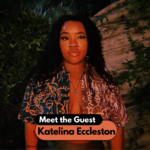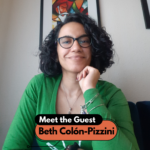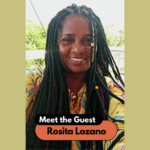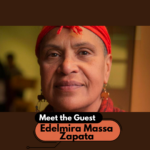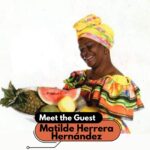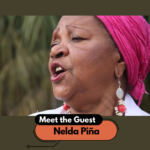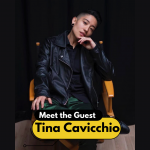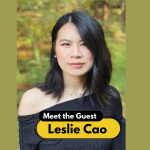 Singles are episodes that appear out of sequence from what we originally planned to deliver. They emerge as a response to a pressing issue or are related to a particular topic of interest.
Singles are episodes that appear out of sequence from what we originally planned to deliver. They emerge as a response to a pressing issue or are related to a particular topic of interest.
EPISODES
Single 12: Perreo 101 – Extended Interview with Katelina Eccleston (La Gata)
Katelina Ecclestón is the creator of Reggeatón con La Gata, the first femme platform dedicated to reggaetón analysis and history, and Perreo 101, a bilingual podcast detailing the evolution of reggaetón. Katelina is also the lead researcher on MTV’s upcoming show De la Calle. Katelina talks to us about the journey toward becoming a prominent platform dedicated to the analysis and history of reggaetón. She also shares about her upbringing, perspectives related to the history and development of reggaetón, and her work as a burgeoning reggaetón artist. You can find a summarized version of this interview in our season 2 episode about reggaetón: Track 8: When Dancing Reggaetón.
Guest:
Single 11: Quítate Tú Pa’ Ponerme Yo: Extended Interview with Beth Colón Pizzini
Dr. Beth Colón Pizzini is an Assistant Professor of Instruction at the University of Texas at Austin in the African and African Diaspora Studies Department. In this episode, she talks to us about the history of reggaetón, the contribution of various Caribbean countries, the evolution of the genre, the political and moralistic fights surrounding the rhythm, and her own connection to the reggaetón rhythm. You can find a summarized version of this interview in our season 2 episode about reggaetón: Track 8: When Dancing Reggaetón.
Guest:
Single 10: Flow Caribe
Inka, rapper, music producer, educator, and cultural manager based in Villa Mella, in the Dominican Republic, tells us about his musical approach that he calls “cimarronaje musical” and tells us about various topics including the black rhythmic bases of reggaeton and dembow, the anti-blackness present in the construction of the Dominican identity, and the importance of Afro-descendant communities such as Villa Mella that prevent the rich Black cultural heritage in Latin America from being lost. This Single contains the extended interview we had with Inka. A summarized version of the interview can be found in English on Track 8 of our second season: Cuando Baila Reggaetón / When Dancing Reggaetón.
Inka, rapero, productor musical, educador, y gestor cultural ubicado en Villa Mella, en la República Dominicana, nos habla sobre su enfoque musical que él llama “cimarronaje musical” y nos cuenta sobre varios temas incluyendo las bases rítmicas negras del reggaetón y del dembow, la anti-negritud presente en la construcción de la identidad dominicana, y la importancia de comunidades afrodescendientes como Villa Mella que evitan que la rica herencia cultural negra en Latinoamérica se pierda. Este Single contiene la entrevista extendida que tuvimos con Inka. Una versión resumida de la entrevista puedes encontrarla en inglés el en Track 8 de nuestra segunda temporada: Cuando Baila Reggaetón.
Guest:
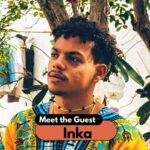
Single 9: Muchachas Cumbiamberas
Folklore experts Edelmira Massa Zapata and Rosita Lozano share with us their knowledge about the origins of cumbia and what it represents for Colombian and Latin American culture, highlighting the deep meeting of African and Amerindian cultures in the heart of Colombia, the cumbia. This Single contains the extended interviews we had with Edelmira and Rosita. You can find a summarized version of the interview in Track 7 of our second season: Yo Me Llamo Cumbia/My Name is Cumbia.
Las expertas folcloristas, maestras Edelmira Massa Zapata y Rosita Lozano nos comparten su conocimiento sobre los orígenes de la cumbia y lo que representa para la cultura colombiana y latinoamericana, resaltando el profundo encuentro de las culturas Africana y Amerindia en el corazón de la cumbia.
Guests
Single 8: Esa Palenkera
The distinguished palenquera Matilde Herrera Hernández, Colombian folk dance teacher with more than 50 years of experience, ethno-educator and director and choreographer of the Kumbé Dance Group, tells us about Palenque, its language, its culture and its legacy to Colombian culture. his episode is in Spanish. You can always find the edited and English translated version of this interview in WYL? Track 19: Palenquero
La distinguida palenquera Matilde Herrera Hernández, profesora de bailes folclóricos colombianos con más de 50 años de experiencia, estudiada etnoeducadora, directora y coreógrafa del Grupo de Danzas Kumbé, nos habla sobre Palenque, sobre su lenguaje, su cultura y su legado a la cultura colombiana.
Guest
Single 7: Eco de Mis Ancestros / Echos of My Ancestors
Singer and song-writer of bailes cantaos Nelda Piña, of group Nelda Piña y sus Tambores, shares with us her life journey and her knowledge about the roots of bullerengue and cumbia. She talks about the contributions of Black people to these rhythms and touches on the importance of supporting the youth in the places where these rhythms are created. And she sings for us a little bit of “Palenquero” a beautiful song in her latest album “Eco de Mis Ancestros.” This episode is in Spanish, so if you understand Spanish or are looking to improve your listening comprehension, you’re in the right place. You can always find the edited and English translated version of this interview in Track 7: Yo Me Llamo Cumbia/My Name is Cumbia
Guest
Single 6: Oiga, Mire, Vea / Listen, Look, Pay Attention
In this single we celebrate the first anniversary of our podcast and reflect on the knowledge that all of our incredible guests have generously shared with us. We talk about our mission to advance anti-racism in the Afro-Latin dance community and we also reflect on our work in season one, Were You Listening?, our singles and our ongoing second season.
The Team



Single 5: Hong Kong Mambo
Due to the rise in anti-Asian hate and the shooting in Atlanta last month we decided to follow on our antiracist principles and delay our next rhythms episode to devote the month of April to explore Asian and Asian American experiences through the lens of dancers from the Afro-Latin dance community. Susan Mykalcio, our graphics content creator and the host for this episode, met with social dancers, Leslie Cao and Ron Nguyen, and professional dancers, Peiwei Li Cobo, and Tina Cavicchio. They talked about instances of racism, their feelings around Identity, and connecting to and honoring Afro-Latin culture being of Asian background.
Guests
Single 4: Palo Yaya
Marisol Blanco met with host Andrés Hincapié for the most recent episode of our second season, which was devoted to Afro Cuban rhythms. The conversation with Marisol was so rich, we knew we had to find a way to let ya’ll listen to the whole thing in Marisol’s own voice. So we made it into a Single. This episode is in Spanish, so if you understand Spanish or are looking to improve your listening comprehension, you’re in the right place. You can always find the edited and English translated version of this interview in Track 2, Afro Cuba.
Guest
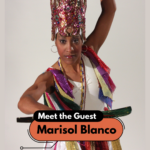
Single 3: Negrita/ Dear (little) Black woman
We explore meanings, connotations and uses of the word “negrita” and the implications of such uses. Our guests Andrea Bolivar, Briana Harrison, and William Garcia-Medina help us navigate the topic.
Guests



Single 2: Gotitas de color/ Little drops of color
Together with three guests from the dance community, we dive into the nuances of colorism within various ethnic identities. We also talk about actionable steps to make our dance space more welcoming.
Guests



Single 1: No podrán destruir mi vida/ They won’t be able to destroy my life
We talk about coping and empathy when consuming distressing news about police brutality and racism. We also talk about the late Chadwick Boseman and his impact on the culture. We introduce the concept of “Singles”
